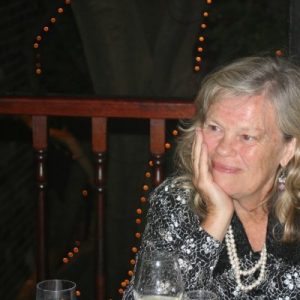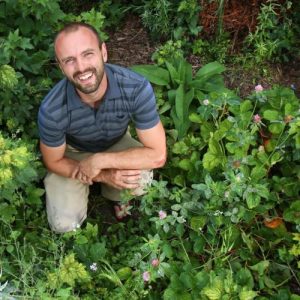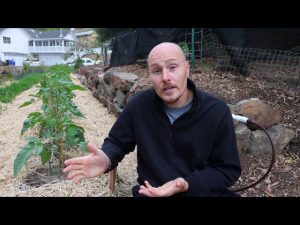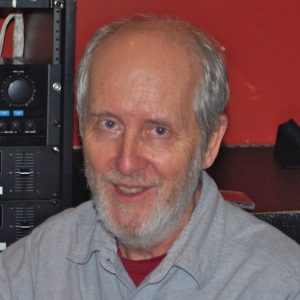You hear about a crashing ecosystem, from climate disruption to disappearing species and landscapes. What to do? There are two options: try to organize social change, or try to escape to a safer place. In this show, you will hear a sample of both. From 3CR radio in Australia, Vivien Langford explores personal carbon rations with Tina Fawcett, author of the book “Suicidal Planet”. Then Californian permaculture podcaster Diego talks with Canada’s permie guru Rob Avis: how to find an “anti-fragile” place to live. The search goes on.
Listen to or download this Radio Ecoshock show in CD Quality (57 MB) or Lo-Fi (14 MB)
Vivien Langford produces and hosts the “Beyond Zero Emissions” radio program on 3CR community radio in Melbourne Australia. 3CR also broadcasts Radio Ecoshock every week. I play the first half of this program, as Vivien talks with Tina Fawcett. Within living memory, Great Britain imposed strict rations on consumption of all kinds during World War Two. As one way to stave off a global climate disaster, the UK government just explore the possibility of bringing back limits on the amount of carbon each person can emit into the sky.
Let’s face it: WE CAN’T ALL CONTINUE TO BURN AS MUCH CARBON AS WE FEEL LIKE…. There will have to be limits. I cringe when I hear someone breathlessly describe how they flew their whole wedding party to Fiji for a fabulous tropical party. Do the bride and groom expect to have children? What world will they live in? That goes all the way back to you and I. Can we really still drive across the country because we want to see some scenery? Are we still in a world where I can legally buy 4 generators, fill them full of gasoline, and just let them run for the Hell of it? Are we still racing cars around race tracks and buying monster SUV’s for fun and status? If so, buckle up, because climate change is going to be your next monster adventure.
So, boring or impossible as it sounds, Tina Fawcett and Vivien have the talk we all need to have: personal carbon rations. Thanks for doing this Vivien! Vivien is kind of a radio buddy of mine – we talk by email and listen to each other’s shows when we can. Vivien follows up in this program with an interview with famous British author and journalist George Monbiot. Unfortunately, I did not have time to run that. Find a link to get the whole show at bze.org.au, or grab that whole broadcast here.

Broadcaster Vivien Langford
The book “The Suicidal Planet: How to Prevent Global Climate Catastrophe” was published in 2007 by Mayer Hillman, Tina Fawcett, and Sudhir Chella Rajan.
Vivien provides these follow-up links for this interview and her show:
1.Suicidal Planet
by Tina Fawcett, Mayer Hillman and Sudhir Chella Rajan
https://www.publishersweekly.com/978-0-312-35355-1
http://low-carbon-renovation.blogspot.com/
Youtube with Dr Yael Parag: http://www.eci.ox.ac.uk/people/tfawcett.html
Mayer Hillman: https://www.theguardian.com/environment/2018/apr/26/were-doomed-mayer-hillman-on-the-climate-reality-no-one-else-will-dare-mention
2. “Out of the Wreckage” by George Monbiot
https://www.theguardian.com/books/2017/sep/14/out-of-the-wreckage-george-monbiot-review
—————————————————————————————————————————————————————————————————–
FINDING YOUR OWN “ANTI-FRAGILE” PROPERTY – Rob Avis and Diego Footer
A few years ago I left Vancouver Canada to find a more sustainable home and a healthy place to grow more of our own food. Many people have that dream, but what should we look for, and what should we watch out for? From California, Diego Footer has a great podcast series called “Permaculture Voices”. I tuned in to episode #226 titled “Tips and Thoughts for Buying an Anti-Fragile Property – The Anti-fragile Property Series with Rob Avis – Part 2”. Here is Diego with Rob Avis, co-founder of Verge Permaculture in Canada.

Rob Avis, permaculture teacher
The Verge Permaculture began in Alberta Canada, with Michelle Avis and husband Rob. They morphed from being engineers in Canada’s oil fields to finding a way of life that promotes healthy life. Rob and Michelle studied regenerative design at the pioneering Nordic Folkecenter for Renewable Energy in Denmark and have made the whole field their life study and teaching. They have a permaculture homestead in Calgary Canada (I visited there) – and also seem to work with some property near Invermere B.C. (which I hope to check out soon).
In 2015, to make a living for their family, they also started a for-profit company called Adaptive Habitats. They offer a two hour free video course on finding your own property (at their web site), and you can take on of their twice yearly courses on site, or even have a custom consultation and design of either a “retreat” property, or just rural permaculture choices.
Diego Footer (mainly just known as “Diego) is host of the Permaculture Voices podcast. I highly recommend it. Tune in at permaculturevoices.com. Find this whole discussion on choosing a property (just over one hour long) here.

Diego Footer, Permaculture podcaster
If you missed Part One, check that one out, Episode 222, here. All of Rob Avis’ talks with Diego are conveniently listed here.
This “Voices of Change” podcast is hosted by Diego Footer. Here is a podcast with Diego Footer who talks about his Creative Destruction podcast, and here is the web page for that Creative Destruction podcast.
Part of my interest is in survival resilience for seniors, whose abilities (physical and/or mental) may decline. That may happen during a period of social and economic decline. Resilience for a partial or very slow moving collapse, at least in the country or region inhabited, could happen while more serious and deadly collapse occurs overseas. That is different and less than the prepper who expects a complete and/or fast moving collapse. Note the slow pace of the 2008 crash, which actually took a year to play out. The same is true of the Great Depression. The trigger may have been the 1929 stock market crash, but the worst of the Depression showed up three years later in 1932 and after.
Here are some of my notes from this interview excerpt with Rob Avis and Diego. Rob consider resilience as a middle stage between fragile and anti-fragile. Resilient things, in this “granular” definition, resist being broken. Antifragile things strengthen with challenges and volatility. However, if you remove stress from an antifragile thing, it can atrophy, like our muscles when not used.
Before looking at land: what are you trying to insure against? Social disruption, food disruption, energy grid crash, climate crash?
Rob talks about having biology versus technology. A property can have technology like solar panels and batteries, but the biology is key for survival, and living well, he says. A primary need for any property is a water source. People in the Northern Hemisphere have a unique opportunity with snow. A person can plan to harvest and store that frozen water, for use later in the hot season when water might be scarce.
Solar access is also important. Permaculturists and ecological land designers love to find south facing slopes, especially in colder climates like the Northern United States and Canada. The same would apply in Scandinavia, and likely where altitude can add a level of cold. Then the soil: how alive is it with microbes, decomposition, depth? You may want to consider access to a market, if you want to trade your production, and the regulatory environment: what are the zoning bylaws and restrictions you may face.
In the previous episode, Rob cautioned that people tend to buy the wrong piece of land when driven by sentiment. Part of the problem is that we are used to comparison shopping for small things, like at a grocery or hardware store, but seldom have the experience of buying a big-ticket item like land. “We tend to look at the lipstick” says Avis. The “lipstick” might be the view, or how nice the kitchen is. Inevitably, if a couple is buying, they may have different needs, and Rob can end up almost as a marriage counselor. And making a major investment, then finding the property is not what you need or want, can lead to tears.
Remember that when you hire a real estate agent, there is a huge conflict of interest. The real estate agent wants to make a sale, to make a commission. Some are good at representing you, but they still want a sale. Rob says he always asks himself, not just in land purchase but in any venture: “What is the weakest link”? Where are the problems going to come up? What cannot be solved, or is way to expensive too solve?
“I think water is going to be the master resource in the future” Rob says. Then he makes another key survival skill: teach yourself how to fast. In addition to preparing your land or skills, “there’s all sorts of mental things you can do to harden yourself” if hard time come. Teach yourself to live with less right now.
Avoiding Type One Errors in Land Purchasing.
One example is buying a house in a flood plain. Even if it’s only a 1-in-500 year chance, with climate change those extremes become more likely. I would add buying near a possibly active volcano, a nuclear plant, and other unrecoverable risks. Another that Rob gives is building a home in a forest where all the seeds of those trees require fire to germinate. The trees expect a fire. You should too. It may be OK to locate there if you have enough water resources to at least protect your home. Another bad error says Rob, is buying a house that has a sump pump that runs every 5 minutes. The ground water is too high, and to go off grid, you always need power to keep the sump pump going – or have your personal flood.
Rob says he expects society to go on more or less as it is – “I’m not a doomsayer”. By the way, he is speaking from Calgary, Canada during this podcast. Also, people can think they want super remote living, but then find it’s lonely, low social life, and few support systems. As weird as it sounds, Rob says that access to the internet can be really important especially in a remote location. “Human connection plays into resilience. It’s really important.”
——————————
SUMMER PLANS FOR RADIO ECOSHOCK
In September I’ll be back with another year of all new Radio Ecoshock shows. Starting next week, I’ll be pulling some of the really big interviews from past Radio Ecoshock shows as our summer programming begins. These scientists, authors and activists stand the test of time, and they are worth your time, so please keep tuning in.
At the end of this program I play a few bars of music from “Chill Out India” by Areil Kalma (used with permission). Most of the other music you hear at the start of the shows, or interviews, I write myself using computer synthesizers and Ableton Live 9. That also helps smaller radio stations avoid any copyright license requirements.
My sincere thanks to all the listeners who keep this show going with their financial help. Find out how you can help here.
As always, thank you for listening, and caring about our world.

It looks like the “anti-fragile” podcast is actually entitled “Creative Destruction” in the iTunes store. Further, that episode doesn’t seem to be available there. It is listed online but is inaccessible right now: https://www.permaculturevoices.com/blog-2/podcast-2/
Thanks for introducing this podcast, but perhaps someone should let the creator know that it’s all a bit jumbled up and partially inaccessible right now. Also you might want to make a note about this in the notes for the episode. It was confusing and difficult to find!
Hi – I double clicked that link in your comment, and did get to the listing on Diego’s Creative Destruction page. If you scroll down, you can find that podcast, and either listen to it right on the page (with a play button) or download it (using the download link, usually with a right click). No Itunes need be involved.
It’s naive to assume that if your country really goes through a major crisis, that there still will be a stable government willing and able to bother protecting your property rights. And I don’t just mean there still being police to protect you from people just simply taking away your land by force of arms. Think of the long-standing custom of “biletting” occupation soldiers with local farmers. Or of the winning country in a war giving the land to its own settlers, especially if the reason for the war was that the other country couldn’t feed its people anymore. And while an invasion of the US is pretty much impossible (due to the nuclear arsenal), drastic changes in government due to social crisis can result in the same effect. As my father (who was born during WWII and his family’s centuries-old farm was largely expropriated by the new socialist government of East Germany during the time of collectivism) used to say: “Always remember that they can take everything from you – EVERYTHING – except for what’s in your head.” I.e. knowledge and skills.
That said, of course there are some “inherently anti-fragile” properties a piece of land can have. Of the top of my head:
– Halfway decent soil: not pure clay or sand, and you should be able to dig down at least a foot (better two) without encountering the subsoil. Building significant amounts of new topsoil takes a lifetime, and you won’t have enough organic matter inputs to do it on a scale of more than a family kitchen garden – so your arable fields (for bulk crops like potatoes and grains) need to be naturally fertile. Remember that, if push really comes to shove, you won’t be able to buy NPK fertilizers anymore. Also, test the soil for heavy metals contamination etc. before you buy.
– Ideally, the property should have a groundwater spring, not just surface water (the former is normally safer to drink). Test the water, too.
– My family’s farm had a little (just 1-2 yards wide) brook going through the small fruit orchard by the house (in addition to the aforementioned underground spring). This made large amounts of water for the vegetable garden and the animals always available, and it enabled the raising of trout (in a box hanging in the stream) and carp (in a large artificial pond). Also, it enabled my family for centuries to operate the local grain mill (or currently, a small run-of-the-river power station) after damming the water in the mill pond for more pressure, which incidentally made my family especially valuable to the village community. (This meant for example that my grandfather was not ratted out by his neighbours when he hid in the hayloft when Nazi Germany’s officials came around to draft him into the army. This happened under circumstances when deserting held the death penalty and conscientous objectors were sent to a concentration camp. My other grandfather, living in a city, was not so lucky, though even he managed to get back from the Western front after just a year and be stationed somewhere safer by reasons of having essential skills (he was a trained pharmacist). Most younger men, however, had nothing but their bodies and so were forced into the meatgrinder. On the other hand, if you’re a woman and you train in some medical profession, this makes you more likely to get you drafted, not less. My country still has a law that enables the state to draft every able-bodied man between 18 and 50, and every woman with medical skills, in case the country is directly attacked.)
– There also was a lake nearby, for fishing.
– Make sure you don’t live anywhere near a river that’s fed from a mountain range (either by snow/glacier melt or rains coming down on those mountains), nor a river that’s connected to a major mountain-fed river by man-made canals. My hometown now is surrounded by several rivers, but they originate from a number of springs and lakes in a plain between us and the sea. This makes us pretty much the only area in the country spared the supposedly-once-a-century-but-nor-once-every-decade spring floods that have the other big rivers burst their limits and flood the towns founded on their sides centuries ago.
– A bit of forest is essential if you’re serious about being energy-independent, even if it’s not big enough to support hunt-able animals. Leafy trees should be prefered (they produce nuts and acorns that are eaten by squirrels and larger birds, which then can be hunted; and deer prefer their bark/leaves as well). If there are beeches or oaks, you or your descendants can fatten pigs on them, which was done in Europe for many centuries, especially by farmers aiming to sell the pigs before winter, not just raise one pig per year for their own needs. The pigs love to root around in the forest, since that is the natural way in which their wild ancestors lived. Also, the woody area should already have at least some mature coppice-able trees (hazel, willow, etc.), as they do take 10-20 years to get to the point where you can start harvesting them for firewood or arm-thick construction posts, even if they grow much faster than other trees.
– If you make sure the subsoil doesn’t consist of bedrock at least some 10 feet down, it will be much easier to build a root cellar and ice cellar (meaning you won’t need refrigeration; the former holds a constant 4-6°C due to being below the level of ground frost and the latter is where you put about a ton of ice from the pond in the winter and it won’t all melt until next autumn).
– A source of pure clay nearby makes brick-making easier for your descendants. Brick walls insulate better than wood. Also, loamy soil is always better than sandy soil in terms of micronutrient content and drought resistance, so better choose an area with general clay-based, alluvial soil structure, not one of the sander areas left by the last ice age. (Though river deltas are still a bad idea, even if they have great soil, due to the flood / sea level rise risks.)
– By all that’s holy, stay far away from the fallout zone of any nuclear power plant! That still won’t protect you from fallout drifting on the wind when (not if) the major electricity grid black-outs (due to storms or just lack of maintenance) come ever more often and the plant operators can’t get the fuel for the diesel back-up generator quickly enough to prevent the spent-fuel pool overheating and exploding. (I live several countries away from Chernobyl, but radiation-accumulators like mushrooms and the animals that eat them (mainly wild boars) are sometimes still too radioactive for human consumption, even now.) But at least living as far away from one of those time bombs as possible will spare you the fate of the residents of Fukushima, whose topsoil is so heavily contaminated with radioactivity that they can’t grow safe food there for decades or centuries.
I started listening to part 1 of the podcast with Rob and Diego. Got to about halfway when the contradiction got too much for me. The whole idea of land as insurance rests on the assumption that there will be a civilisation stable enough to garantee property rights. As Vivi points out, in times of upheaval governments may confiscate land just as much as they confiscate gold.
“Don’t raise livestock, just go hunting”. I can see that working well as hundreds of millions of people join you.
https://imgs.xkcd.com/comics/land_mammals.png
Tradable Energy Quotas (TEQs) have also been proposed to ration carbon. Google it